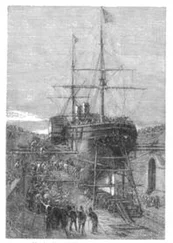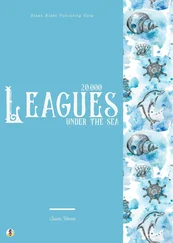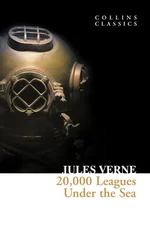Jules Verne - Twenty Thousand Leagues Under the Sea
Здесь есть возможность читать онлайн «Jules Verne - Twenty Thousand Leagues Under the Sea» — ознакомительный отрывок электронной книги совершенно бесплатно, а после прочтения отрывка купить полную версию. В некоторых случаях можно слушать аудио, скачать через торрент в формате fb2 и присутствует краткое содержание. Жанр: sf_writing, на английском языке. Описание произведения, (предисловие) а так же отзывы посетителей доступны на портале библиотеки ЛибКат.
- Название:Twenty Thousand Leagues Under the Sea
- Автор:
- Жанр:
- Год:неизвестен
- ISBN:нет данных
- Рейтинг книги:5 / 5. Голосов: 2
-
Избранное:Добавить в избранное
- Отзывы:
-
Ваша оценка:
- 100
- 1
- 2
- 3
- 4
- 5
Twenty Thousand Leagues Under the Sea: краткое содержание, описание и аннотация
Предлагаем к чтению аннотацию, описание, краткое содержание или предисловие (зависит от того, что написал сам автор книги «Twenty Thousand Leagues Under the Sea»). Если вы не нашли необходимую информацию о книге — напишите в комментариях, мы постараемся отыскать её.
Twenty Thousand Leagues Under the Sea — читать онлайн ознакомительный отрывок
Ниже представлен текст книги, разбитый по страницам. Система сохранения места последней прочитанной страницы, позволяет с удобством читать онлайн бесплатно книгу «Twenty Thousand Leagues Under the Sea», без необходимости каждый раз заново искать на чём Вы остановились. Поставьте закладку, и сможете в любой момент перейти на страницу, на которой закончили чтение.
Интервал:
Закладка:
During the nineteen days mentioned above, no incident of any note happened to signalize our voyage. I saw little of the captain; he was at work. In the library I often found his books left open, especially those on natural history. My work on submarine depths, conned over by him, was covered with marginal notes, often contradicting my theories and systems; but the captain contented himself with thus purging my work; it was very rare for him to discuss it with me. Sometimes I heard the melancholy tones of his organ; but only at night, in the midst of the deepest obscurity, when the Nautilus slept upon the deserted ocean. During this part of our voyage we sailed whole days on the surface of the waves. The sea seemed abandoned. A few sailing-vessels, on the road to India, were making for the Cape of Good Hope. One day we were followed by the boats of a whaler, who, no doubt, took us for some enormous whale of great price; but Captain Nemo did not wish the worthy fellows to lose their time and trouble, so ended the chase by plunging under the water. Our navigation continued until the 13th of March; that day the Nautilus was employed in taking soundings, which greatly interested me. We had then made about 13,000 leagues since our departure from the high seas of the Pacific. The bearings gave us 45 37' south latitude, and 37 53' west longitude. It was the same water in which Captain Denham, of the Herald, sounded 7,000 fathoms without finding the bottom. There, too, Lieutenant Parker, of the American frigate Congress, could not touch the bottom with 15,140 yards. Captain Nemo intended seeking the bottom of the ocean by a diagonal sufficiently lengthened by means of lateral planes, placed at an angle of forty-five degrees with the water-line of the Nautilus. Then the screw set to work at its maximum speed, its four blades beating the waves with indescribable force. Under this powerful pressure the hull of the Nautilus quivered like a sonorous chord, and sank regularly under the water.
At 7,000 fathoms I saw some blackish tops rising from the midst of the waters; but these summits might belong to high mountains like the Himalayas or Mount Blanc, even higher; and the depth of the abyss remained incalculable. The Nautilus descended still lower, in spite of the great pressure. I felt the steel plates tremble at the fastenings of the bolts; its bars bent, its partitions groaned; the windows of the saloon seemed to curve under the pressure of the waters. And this firm structure would doubtless have yielded, if, as its captain had said, it had not been capable of resistance like a solid block. In skirting the declivity of these rocks, lost under the water, I still saw some shells, some serpul? and spinorbes, still living, and some specimens of asteriads. But soon this last representative of animal life disappeared; and at the depth of more than three leagues, the Nautilus had passed the limits of submarine existence, even as a balloon does when it rises above the respirable atmosphere. We had attained a depth of 16,000 yards (four leagues), and the sides of the Nautilus then bore a pressure of 1,600 atmospheres, that is to say, 3,200 pounds to each square two-fifths of an inch of its surface.
"What a situation to be in!" I exclaimed. "To overrun these deep regions where man has never trod! Look, captain, look at these magnificent rocks, these uninhabited grottoes, these lowest receptacles of the globe, where life is no longer possible! What unknown sights are here! Why should we be unable to preserve a remembrance of them?"
"Would you like to carry away more than the remembrance?" said Captain Nemo.
"What do you mean by those words?"
"I mean to say that nothing is easier than to take a photographic view of this submarine region."
I had not time to express my surprise at this new proposition, when, at Captain Nemo's call, an objective was brought into the saloon. Through the widely opened panel, the liquid mass was bright with electricity, which was distributed with such uniformity that not a shadow, not a gradation, was to be seen in our manufactured light. The Nautilus remained motionless, the force of its screw subdued by the inclination of its planes: the instrument was propped on the bottom of the oceanic site, and in a few seconds we had obtained a perfect negative. I here give the positive, from which may be seen those primitive rocks, which have never looked upon the light of heaven; that lowest granite which forms the foundation of the globe; those deep grottoes, woven in the stony mass whose outlines were of such sharpness, and the border lines of which are marked in black, as if done by the brush of some Flemish artist. Beyond that again a horizon of mountains, an admirable undulating line, forming the prospective of the landscape. I cannot describe the effect of these smooth, black, polished rocks, without moss, without a spot, and of strange forms, standing solidly on the sandy carpet, which sparkled under the jets of our electric light.
But the operation being over, Captain Nemo said: "Let us go up; we must not abuse our position, nor expose the Nautilus too long to such great pressure."
"Go up again!" I exclaimed.
"Hold well on."
I had not time to understand why the captain cautioned me thus, when I was thrown forward on to the carpet. At a signal from the captain, its screw was shipped, and its blades raised vertically; the Nautilus shot into the air like a balloon, rising with stunning rapidity, and cutting the mass of waters with a sonorous agitation. Nothing was visible; and in four minutes it had shot through the four leagues which separated it from the ocean, and, after emerging like a flying-fish, fell, making the waves rebound to an enormous height.
| Go to Contents |
During the nights of the 13th and 14th of March, the Nautilus returned to its southerly course. I fancied that, when on a level with Cape Horn, he would turn the helm westward, in order to beat the Pacific seas, and so complete the tour of the world. He did nothing of the kind, but continued on his way to the southern regions. Where was he going to? To the pole? It was madness! I began to think that the captain's temerity justified Ned Land's fears. For some time past the Canadian had not spoken to me of his projects of flight; he was less communicative, almost silent. I could see that this lengthened imprisonment was weighing upon him, and I felt that rage was burning within him. When he met the captain, his eyes lit up with suppressed anger; and I feared that his natural violence would lead him into some extreme. That day, the 14th of March, Conseil and he came to me in my room. I inquired the cause of their visit.
"A simple question to ask you, sir," replied the Canadian.
"Speak, Ned."
"How many men are there on board the Nautilus, do you think?"
"I cannot tell, my friend."
"I should say that its working does not require a large crew."
"Certainly, under existing conditions, ten men, at the most, ought to be enough."
"Well, why should there be any more?"
"Why?" I replied, looking fixedly at Ned Land, whose meaning was easy to guess. "Because," I added, "if my surmises are correct, and if I have well understood the captain's existence, the Nautilus is not only a vessel, it is also a place of refuge for those who, like its commander, have broken every tie upon earth."
"Perhaps so," said Conseil; "but, in any case, the Nautilus can only contain a certain number of men. Could not you, sir, estimate their maximum?"
"How, Conseil?"
"By calculation; given the size of the vessel, which you know, sir, and consequently the quantity of air it contains, knowing also how much each man expends at a breath, and comparing these results with the fact that the Nautilus is obliged to go to the surface every twenty-four hours."
Читать дальшеИнтервал:
Закладка:
Похожие книги на «Twenty Thousand Leagues Under the Sea»
Представляем Вашему вниманию похожие книги на «Twenty Thousand Leagues Under the Sea» списком для выбора. Мы отобрали схожую по названию и смыслу литературу в надежде предоставить читателям больше вариантов отыскать новые, интересные, ещё непрочитанные произведения.
Обсуждение, отзывы о книге «Twenty Thousand Leagues Under the Sea» и просто собственные мнения читателей. Оставьте ваши комментарии, напишите, что Вы думаете о произведении, его смысле или главных героях. Укажите что конкретно понравилось, а что нет, и почему Вы так считаете.












